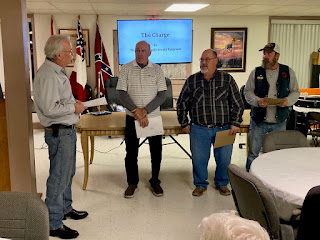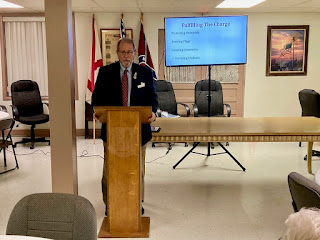Twenty two members and guests of SCV Camp 1524 met on Thursday evening February 9th for their monthly meeting. 1st Lt Cmdr Rob Schwartz played his guitar and sang a number of songs during the social time before the meeting as beverages and snacks were also made available for those who arrived early. Rob also started the meeting with a Benediction followed by the pledges and salutes to the flags led by Color Sgt John Dennis. Commander Stuart Waldo then recited the SCV Charge which was appropriate as that was the subject of the guest speaker for the evening, SCV Alabama Division Lt Cmdr John Land of the Montgomery Semple Camp. But before John's presentation, three new members were sworn in, Larry McGowan (who rides with the Alabama Division Mechanized Cavalry), Todd Rogers who has already helped the camp at the Prattville Christmas parade and the Millbrook Mardi Gras festival recently and, Doug Smith who has helped numerous times at cemetery maintenance cleanup events having joined some time previously. Upcoming events including a number of reenactments and the Confederate Battle flag setting for April as Confederate History and Heritage month were highlighted.
John began his presentation on the SCV Charge by stressing that we should not take reciting it for ranted without thinking about the meaning. We say the Pledge of Allegiance without knowing the history. The Pledge was written in August 1892 by socialist Baptist minister Francis Bellamy. It was written largely to indoctrinate the youth of the country to pledge allegiance to the country as a single indivisible republic which contradicts the right of secession for which our country's founding fathers and our Confederate ancestors fought. Prior to World War II it was recited accompanied with a salute with the right arm extended outward much the same as the Nazi salute in Hitler's Germany.
The SCV is an organization for male descendants of Confederate veterans and as men we are implored by the Charge to defend our families, our home, our country and out culture. It is a responsibility which should be taken very seriously. The Charge states we are to vindicate the Confederate veterans' cause, to provide evidence that they were blameless in their pursuit of Southern independence and not guilty of any treasonous act by law or circumstance. The Cause is the reason behind the action. If a person is accused, their name is dishonored. If they are vindicated, their honor is restored. The false revisionist history being spread by the woke progressives contain false accusations against our Confederate ancestors honorable fight for independence. History must be accurate and complete or it loses all credibility.
We are to "emulate (their) virtues" which included courage, discipline, faithfulness, honor, courtesy, industriousness, perseverance, self-reliance and truthfulness. We are to "perpetuate those principles (they) loved". They were fighting for a faithfulness to the Constitution, sovereignty of the states, and limited self-government. The "ideals which made (them) glorious" for which they struggled mightily in the War Between the States include liberty, self-rule and independence. We fulfill the Charge by protecting historical monuments, erecting flags, cleaning cemeteries, all to provide evidence that their fight was honorable and they innocent.
Modern academic historians provide lies of a righteous cause myth that the morally superior North fought singularly to end slavery. Here are ten pieces of evidence which refute such revisionist history and claims: 1) no national political party ever campaigned on a platform to end slavery including that of Lincoln in 1860 (which did exclusively posture to restrict slavery from the western territories which would have tilted the balance of power permanently from the Southern Democrat party of they were to achieve statehood as such), 2) Lincoln said in his first inaugural address, " I have no purpose, directly or indirectly, to interfere with the institution of slavery in the States where it exists. I believe I have no lawful right to do so, and I have no inclination to do so", 3) The Corwin Amendment was proposed by Ohio Rep. Thomas Corwin and was approved by Congress and actually ratified by five Northern states before the eleven Southern states seceded before it could be completely ratified and adopted. It would have been the 13th Amendment to the Constitution and would have prevented Congress from forever interfering with slavery in any state, 4) two Union Generals Fremont and Hunter issued orders for the areas of occupation freeing slaves there and Lincoln himself rescinded those orders issuing a revocation ten days following Hunter's order on May 19th, 1862, 5) the Crittenden- Johnson Resolution of July 25, 1861 laid out the reasons for the Union prosecution of the War and contained no mention of slavery whatsoever, 6) Lincoln's letter to Horace Greeley, abolitionist and editor of the New York Daily Tribune specifically disclaimed any abolitionist cause, "My paramount object in this struggle is to save the Union and is not either to save or destroy slavery. If I could save the Union without freeing any slave I would do it", 7) the Emancipation Proclamation issued just 30 days after penning his letter to Greeley only applied to Southern states over which he had no control (but wished to thru military effort) and not to any of the slaves being held in Union occupied territory or any of the Northern slave states including Delaware, West Virginia*, Kentucky, Missouri or New Jersey, 8) West Virginia* was admitted into the United States as a slave state on June 20, 1863 soon after the Emancipation Proclamation, 9) during the Hampton Roads Conference terms of a peace settlement were negotiated which included the Southern states reentering the Union in order to defeat the proposed (new) 13th Amendment which was to abolish slavery and 10) slavery continued in Northern states until 9 months following the War, until the ratification of the 13th Amendment which should nullify any Juneteenth preposterousness as New Jersey held on to slaves til January 23, 1866 (https://nj.gov/state/historical/his-2021-juneteenth.shtml).















